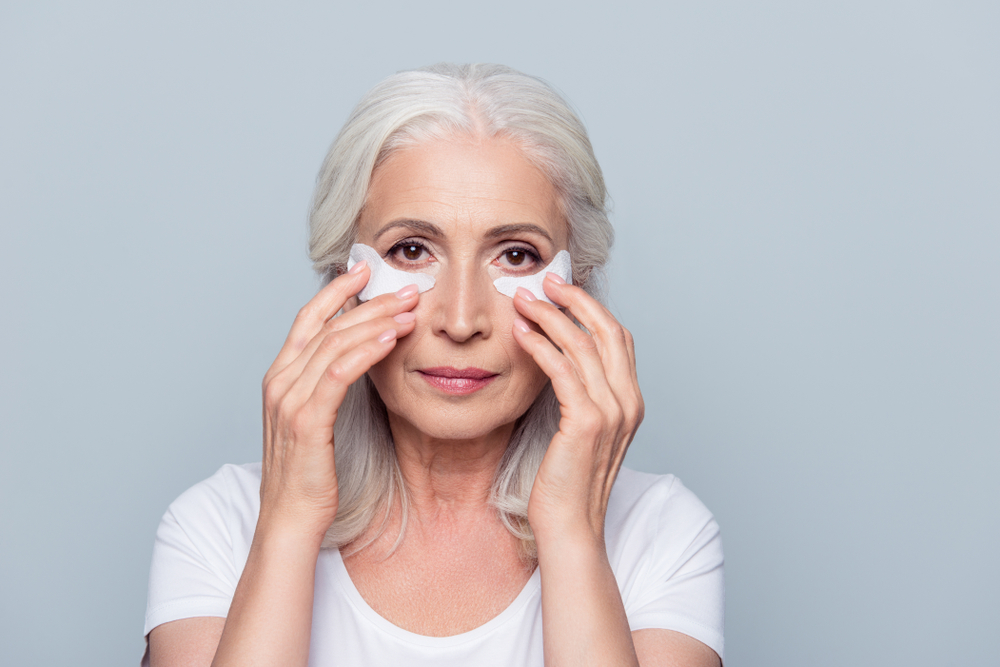The eternal quest- smoother skin, a brighter complexion, no wrinkles and no under eye bags.
Under eye bags can manifest in various forms, including loose skin, fat deposits, changes in pigmentation, and natural shadowing, all contributing to the appearance of dark circles, puffy eyes or a tired look on your face. While these characteristics may be hereditary and observable from a young age, they frequently exacerbate with the passage of time.
There are certain lifestyle adjustments you can implement that might contribute to a sustained reduction in the visibility of under eye bags over time but not a foolproof solution.
Despite the abundance of products in the market that promise to alleviate puffiness and brighten the under-eye region, their efficacy may not always match your expectations.
What causes bags under the eyes?
Under eye bags can develop due to various factors such as genetics, ageing, allergies and skin conditions like eczema or pigmentation. As you age, the tissues around the eyes weaken, leading to sagging and allowing fat to protrude, resulting in puffiness. Fluid retention and shadows may also contribute to the appearance of under eye bags. While they may give the impression of fatigue, under eye bags are typically harmless. However, if accompanied by pain, itchiness, redness, or persistent swelling, it’s advisable to consult a medical professional. Other under eye bag contributing factors include inadequate sleep, smoking, allergies, fluid retention, and genetic predisposition.
Types of eye puffiness
- Under eye puffiness or bags are commonly characterized by slight swelling in the eyelids and under the eye socket, resulting in a tired and droopy appearance. These bags are typically subtle and may only be noticeable from certain angles. While lack of sleep is often associated with this type of puffiness, dehydration or allergic reactions can also trigger such unwanted swelling.
- As we age, the initial puffiness around the eyes can progress into sagging eye bags, which can significantly alter your facial aesthetics. These pockets of fat beneath the eyes create small semi circles, contributing to a changed facial contour. While sagging eye bags are not contagious, they are unpleasant.
- Dark circles appear as black or blue discolorations and stem from insufficient sleep. Fortunately, these dark circles can be alleviated through simple daily home remedies.
Can eye bags go away?
Although completely eliminating eye bags may not be feasible, you might be able to diminish their appearance through lifestyle changes, eliminating habits and the use of topical treatments.
Keep reading to learn how to reduce the appearance of your under eye bags-
- Use a cold compress
You can use a homemade cold compress to relieve your under eye bags or dark circles. The application of a cold compress to the affected area can prompt rapid constriction of the blood vessels. While store-bought cold compresses are an option, DIY methods can be equally effective. Simply dampen a clean washcloth with cool water and gently place it around your eyes for a few minutes. You can substitute the washcloth with a chilled teaspoon, cucumber slices, an ice pack or ice roller. It’s recommended to do this while seated in an upright position.
However, keep in mind that a cold compress is just a temporary solution.
- Apply tea bags
Tea bags, particularly those containing caffeine, are more than just a comforting beverage. They can be utilized under the eyes to address issues like dark circles and puffiness. Caffeine, known for its potent antioxidant properties, can enhance blood circulation in the skin and even provide protection against UV damage, potentially slowing down the ageing process. Research highlights green tea as particularly beneficial due to its anti inflammatory effects. To use tea bags for eye care, steep them in hot water for 3 to 5 minutes, then chill them in the refrigerator for around 20 minutes. Afterward, gently squeeze out any excess liquid and apply the chilled tea bags under your eyes for 15 to 30 minutes. This simple home remedy can offer immediate relief and visible improvement in the appearance of dark circles and puffiness.
- Clear out your sinuses using nasal irrigation
Using a Neti Pot or a nasal lavage can effectively reduce your under eye bags and dark circles. A Neti Pot is a device filled with a saline solution that is poured into your nasal passages to irrigate and cleanse the sinuses, removing mucus and debris. It’s crucial to ensure the water used is clean and safe, as contaminated water can lead to serious infections. To be as safe as possible during nasal irrigation, it’s recommended to either boil and cool the water before using it or opt for sterile or distilled water.
- Stay hydrated
Dehydration is a significant contributing factor to the development of under eye bags. Shockingly, nearly half of the global population fails to meet the daily recommended water intake of 6 to 12 cups per day. Fortunately, hydration doesn’t solely rely on plain water; all fluids contribute to your daily intake like sparkling waters, flavoured waters, fruit-infused water and herbal decaffeinated tea. Staying hydrated is crucial when it comes to preventing dehydration, which can lead to puffy eyes.
- Eat more collagen rich foods
As you age, the muscles and tissues responsible for supporting your eyelids gradually weaken, leading to sagging skin. Increasing your consumption of vitamin C can aid in enhancing your body’s absorption of hyaluronic acid, a crucial compound that diminishes with age. This acid, naturally occurring in the body, plays a vital role in maintaining skin health. Foods abundant in vitamin C and amino acids can further stimulate collagen production, thereby boosting levels of hyaluronic acid and promoting healthier skin. Excellent sources of vitamin C include oranges, red peppers, kale, Brussels sprouts, broccoli and strawberries.
- Eat iron rich foods
Iron deficiency or anemia occurs when there’s a shortage of red blood cells in the blood, which are responsible for transporting oxygen to tissues throughout the body. Insufficient iron levels can lead to the development of dark circles under the eyes. Additional symptoms include extreme fatigue, cold extremities and brittle nails. Iron-rich foods such as red meat, poultry, seafood, beans, leafy greens like kale and spinach, dried fruits like raisins and apricots and iron-fortified foods like cereals and pasta can help replenish your iron levels and alleviate under eye bags.
- Cut back on salty foods
Consuming excessive amounts of salty foods can contribute to the development of under eye bags. Salt affects the body’s fluid retention, leading to overall puffiness and potentially causing health issues. To avoid excess salt start checking food labels for salt content and opting for whole foods over packaged and processed ones. Additionally, controlling your fluid intake before bedtime can help minimize your overnight fluid retention and reduce the appearance of under-eye bags as soon as you wake up.
- Cut back on alcohol
Cutting back on alcohol can be extremely beneficial when it comes to reducing the appearance of under eye bags and dark circles. Alcohol leads to dehydration, which can exacerbate the formation of bags and dark circles under your eyes. If you do enjoy a drink here and there, try to stay hydrated while doing so.
- Wash your face before bed
Improving your nightly skincare routine is key in preventing under eye bags. It’s essential to cleanse your face thoroughly before bed, especially if you wear makeup. Sometimes make up can get stuck in the corners of your eyes or embed itself in your fine lines. Sleeping with makeup on can lead to irritation, allergic reactions and even infections, resulting in redness and puffiness around the eyes. Additionally, neglecting to wash your face before bed may contribute to premature aging and skin damage by oxidative stress. Be sure to wash off all your make up, SPF and the dirt of the day. Going to bed with a clean and hydrated face is imperative to avoid under eye bags, puffiness and redness.
- Add retinol to your routine
Focus on adding specific ingredients like retinol to your skincare routine is crucial for addressing eye bags. Retinol, a derivative of vitamin A available in various forms, improves collagen deficiency when applied topically, though stronger formulations require a dermatologist’s prescription and should be avoided during pregnancy or breastfeeding.
- Apply topical caffeine
Who said your daily caffeine is just for energy? Topical caffeine is a game-changer when it comes to getting rid of those under eye bags. Caffeine constricts your blood vessels and helps with swelling, making your skin appear smoother.
- Use products for hyperpigmentation
Hydroquinone, found in skin-lightening creams, inhibits melanin production, aiding in diminishing dark under-eye circles. Available by prescription from dermatologists, regular use is necessary for lasting effects. It’s best to apply it at night due to potential sunlight sensitivity. Be mindful of the possible side effects of these creams and consult a professional before introducing it into your skincare routine.
- Use sunscreen
Shielding your skin from the sun’s rays with sunscreen is crucial for combating various dermatological concerns, including under-eye bags and dark circles. Opt for broad-spectrum SPF 30 or higher sunscreen. Be sure to reapply it throughout the day, as needed and consider additional protective measures like seeking shade and wearing appropriate clothing to minimize sun exposure.
- Avoid rubbing your eyes and treat your allergies
Reduce allergy symptoms by identifying and avoiding allergens and avoid rubbing your eyelids excessively. RUbbing your eyes and allergies can contribute to puffy dark circles under the eyes along with redness and itching.
- Stay elevated while you sleep
Elevate your head with extra pillows or by raising the top end of your bed to prevent fluid from pooling in your lower eyelids and causing puffiness while you sleep. Use two or more pillows, a wedge pillow, bed risers, or bricks placed under the bed posts.
- Get enough sleep
How you sleep and how much time you sleep for matter. Aim for 7 to 8 hours of sleep nightly to maintain a healthy complexion and minimize the prominence of under eye circles. It’s important to implement a consistent sleep schedule, avoiding stimulants and large meals before bedtime, and practicing relaxation techniques to aid in restful sleep to reduce the appearance of shadows, dark circles and under eye bags.
- Quit smoking, if you smoke
Smoking accelerates collagen loss and depletes vitamin C in your body, leading to wrinkles, skin discoloration, under-eye bags and dark circles. Quitting smoking offers numerous health benefits like prolonged life, reduced risk of various health conditions and no under eye bags.
Takeaway
Dark under eye circles are often genetically influenced, yet their appearance can be lessened through lifestyle adjustments. There are a few dermatological procedures that offer further options for reducing their visibility, although maintenance sessions and lifestyle changes are imperative to sustain the results.




